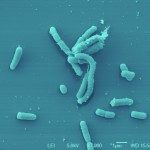Link to Pubmed [PMID] – 33172393
Link to DOI – 10.1186/s12879-020-05565-8
BMC Infect Dis 2020 Nov; 20(1): 822
Plague, a fatal disease caused by the bacillus, Yersinia pestis, still affects resources-limited countries. Information on antibody response to plague infection in human is scarce. Anti-F1 Ig G are among the known protective antibodies against Y. pestis infection. As a vaccine preventable disease, knowledge on antibody response is valuable for the development of an effective vaccine to reduce infection rate among exposed population in plague-endemic regions. In this study, we aim to describe short and long-term humoral immune responses against Y. pestis in plague-confirmed patients from Madagascar, the most affected country in the world.Bubonic (BP) and pneumonic plague (PP) patients were recruited from plague- endemic foci in the central highlands of Madagascar between 2005 and 2017. For short-term follow-up, 6 suspected patients were enrolled and prospectively investigated for kinetics of the anti-F1 IgG response, whereas the persistence of antibodies was retrospectively studied in 71 confirmed convalescent patients, using an ELISA which was validated for the detection of plague in human blood samples in Madagascar.Similarly to previous findings, anti-F1 IgG rose quickly during the first week after disease onset and increased up to day 30. In the long-term study, 56% of confirmed cases remained seropositive, amongst which 60 and 40% could be considered as high- and low-antibody responders, respectively. Antibodies persisted for several years and up to 14.8 years for one individual. Antibody titers decreased over time but there was no correlation between titer and time elapsed between the disease onset and serum sampling. In addition, the seroprevalence rate was not significantly different between gender (P = 0.65) nor age (P = 0.096).Our study highlighted that the circulating antibody response to F1 antigen, which is specific to Y. pestis, may be attributable to individual immune responsiveness. The finding that a circulating anti-F1 antibody titer could persist for more than a decade in both BP and PP recovered patients, suggests its probable involvement in patients’ protection. However, complementary studies including analyses of the cellular immune response to Y. pestis are required for the better understanding of long-lasting protection and development of a potential vaccine against plague.

